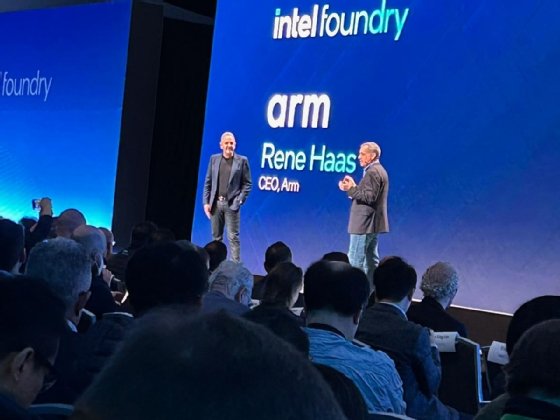
Getty Images/iStockphoto
Intel Foundry launches as enterprise AI surges
If the trend continues, enterprises will need more AI chip suppliers to help stabilize prices and meet the demand for AI processing at the edge and the data center, experts said.
SAN JOSE, Calif. -- If successful, Intel's ambition to become the second-largest semiconductor contract manufacturer could significantly increase chip supplies as enterprises revamp the edge and data centers for AI applications.
Intel officially launched its Intel Foundry business Wednesday, the same day leading AI chip designer Nvidia reported a 265% increase year to year in quarterly revenues. Surging demand for AI computing across companies, industries and countries drove the triple-digit increase, Nvidia CEO Jensen Huang said.
If the trend continues, global chip production will have to rise significantly to meet demand, experts said. Therefore, Intel positioning its worldwide manufacturing operation against Samsung and Taiwan Semiconductor Manufacturing Company Limited (TSMC) could benefit enterprises by increasing chip supplies and stabilizing prices.
"The bottom line is anything good for the supply chain is good for enterprises," said Jack Gold, principal analyst at J. Gold Associates.
At the one-day launch event, Intel CEO Pat Gelsinger told attendees that Intel Foundry wouldn't favor Intel products over those of other chip designers. Instead, it would go head-to-head for business against TSMC and Samsung, intending to surpass the latter to become the second-largest manufacturer behind TSMC by the decade's end.
"The foundry team's objective is to fill the fabs [factories], right, deliver to the broadest set of customers on the planet," Gelsinger told reporters and analysts. "We want to be the foundry for the world."
McKinsey & Co. estimates the global semiconductor industry will reach $1 trillion by 2030, providing plenty of room for another global manufacturer. However, Intel has several challenges in meeting its goal of making AI chips for PCs, the edge and data centers.
The company's manufacturing operation generated $952 million last year -- double that of 2022 but a fraction of TSMC's $69 billion and Samsung's $51 billion, according to financial analyst Dan Nystedt in Taipei.
Closing the gap requires Intel to spend tens of billions of dollars to expand its manufacturing capacity, and the source of those funds is unclear.
Intel delayed the opening of its $20 billion chip manufacturing facility in Ohio from 2025 to 2026 due, in part, to a longer-than-expected timeline for receiving billions of dollars in subsidies from the Chips and Science Act of 2022. The law authorizes nearly $53 billion to increase U.S. semiconductor manufacturing.
U.S. Commerce Secretary Gina Raimondo joined Gelsinger at his keynote via video but provided no updates on the government's negotiations with Intel. Instead, she focused on the importance of the United States building a more robust supply chain by reducing dependence on foreign chip suppliers.
Gelsinger later told TechTarget Editorial that an announcement on CHIPS Act funding would come "very soon." He declined to provide details.

Intel expands its chip manufacturing operations
Intel has made progress in growing its foundry business. At the event, Microsoft CEO Satya Nadella said by video that the company agreed to have Intel manufacture its upcoming in-house chip using Intel's latest 18A manufacturing process. Nadella did not provide details, but in November, Microsoft unveiled plans to introduce in its Azure public cloud this year a custom Arm-based chip named Cobalt and an AI accelerator named Maia.
"All of us at Microsoft are committed to supporting Intel's efforts to build a strong supply chain right here in the United States," Nadella said.
Microsoft and Intel have been partners for decades in combining software and chips for servers and personal computers. Intel, however, demonstrated its willingness to work with rivals by unveiling an initiative with chip designer Arm, whose licensees build products for mobile devices, servers and PCs.
The initiative has the companies collaborating on Intel Foundry services for Arm-based system-on-chips. Arm CEO Rene Haas appeared on stage with Stuart Pann, senior vice president and general manager of Intel Foundry, to promote the collaboration.
"This is a bit of strange bedfellows," Haas said.
About 80% of the chips manufactured by TSMC have an Arm component. "There is no way you can be in the foundry business without a partnership with Arm," Pann said.
Antone Gonsalves is an editor at large for TechTarget Editorial, reporting on industry trends critical to enterprise tech buyers. He has worked in tech journalism for 25 years and is based in San Francisco.




